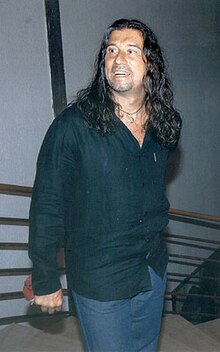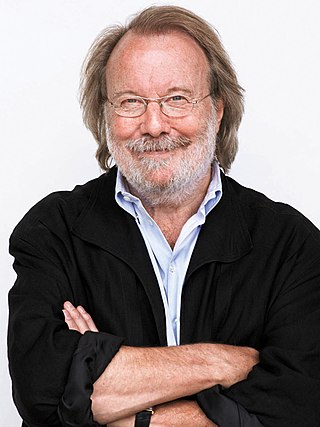
Göran BrorBennyAndersson is a Swedish musician, composer and producer best known as a member of the pop group ABBA and co-composer of the musicals Chess, Kristina från Duvemåla, and Mamma Mia! For the 2008 film version of Mamma Mia! and its 2018 sequel, Mamma Mia! Here We Go Again, he worked also as an executive producer. Since 2001, he has been active with his own band Benny Anderssons orkester.
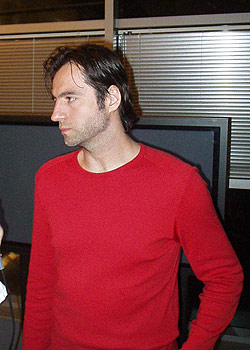
Boris Novković is a Croatian singer-songwriter. He has been active since the 1980s.
Milan "Danijel" Popović, better known simply as Daniel, is a Montenegrin-Croatian pop singer.

Magazin is a Croatian pop band from Split. Founded in 1979 under the name Dalmatinski magazin, the band quickly began to make a mark on local pop music festivals with its songs influenced by Dalmatian folk music. One of the most prominent bands in Yugoslavia and one of the longest lasting, with 45 years active in the music industry in Croatia and former Yugoslavia. The band currently consists of lead vocalist Lorena Bućan, guitarist Željko Baričić and bass guitarist Nenad Vesanović Keko. Baričić is the only active founding member even though Vesanović featured on every album to date.
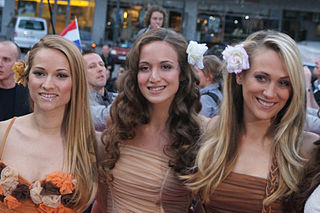
Feminnem is a girl group from Croatia and Bosnia and Herzegovina composed of three members. They represented both countries at the Eurovision Song Contest; Bosnia and Herzegovina in 2005 and Croatia in 2010. On 21 February 2012, Pamela, Neda and Nika decided to start solo careers and leave Feminnem and effectively disbanded the group. They were named after American rapper Eminem. In May 2022, the group were decided to get back together, and their members posted on social media announcement of their comeback.
Tonči Huljić is a Croatian musician, songwriter and music producer. He is best known as the founding member, songwriter and producer of one the most famous Croatian pop bands, Magazin.

Colonia is a Croatian dance music duo from Vinkovci, Croatia. The band has released thirteen albums and over 35 singles to date with various songs and albums gaining platinum status. They are known for winning the first ever Eurodance competition in 2001 and their various hits throughout the years.
André Sergeyi Hovnanyan, better known by the mononym André, is an Armenian singer. He was one of the most popular pop stars of Armenia during the mid-2000s, winning the Best Male Singer trophy at various Armenia Music Awards in 2004–2018.
Martin Vučić is a Macedonian pop musician.

Hari Mata Hari is a Bosnian pop band. Hari Mata Hari is the stage name for the singer Hari Varešanović. The group originated from the city of Sarajevo, the capital of Bosnia and Herzegovina. The group has performed over 1,000 concerts and sold 5 million albums to date. Their songs are among the most famous and popular love ballads in the former Yugoslavia era. Hari Mata Hari was the representative of Bosnia and Herzegovina at the Eurovision Song Contest 2006 held in Athens, Greece. Coincidentally, hari mata hari in Malay stands for 'day of the sun, or Sunday'.

Kaliopi Bukle, known professionally as Kaliopi, is a Macedonian singer-songwriter. In her career, Kaliopi has progressed from singing lead vocal with her eponymous band in 1980s Yugoslavia to being an established vocalist and composer working in North Macedonia and across former Yugoslavia. She represented Macedonia twice in the Eurovision Song Contest, first in 2012 in Baku, Azerbaijan with "Crno i belo" and a second time in 2016 in Stockholm, Sweden with the song "Dona".

Vladimir Vlado Janevski is a Macedonian singer. He was North Macedonia's first Eurovision contestant, finishing 19th in Birmingham at the 1998 Eurovision Song Contest with the song "Ne Zori, Zoro".
Luka Nižetić is a Croatian singer. His debut album Premijera was recorded in 2006. He is best known for his hits "Ponekad poželim" and "Proljeće" ("Springtime").
Popular music in Yugoslavia includes the pop and rock music of the former SFR Yugoslavia, including all their genres and subgenres. The scene included the constituent republics: SR Slovenia, SR Croatia, SR Bosnia and Herzegovina, SR Montenegro, SR Macedonia and SR Serbia and its subunits: SAP Vojvodina and SAP Kosovo. The pop and rock scene was a part of the general Music of Yugoslavia, which also included folk, classical music, jazz etc. Within Yugoslavia and internationally, the phrases ex-YU or ex-Yugoslav Pop and Rock both formally and informally generally to the SFRY period, though in some cases also to its successor the FR Yugoslavia including Serbia and Montenegro which existed until 2006.
Croatia participated in the Eurovision Song Contest 2009 with the song "Lijepa Tena" written by Tonči Huljić and Vjekoslava Huljić. The song was performed by Igor Cukrov featuring Andrea. The Croatian broadcaster Croatian Radiotelevision (HRT) organised the national final Dora 2009 to select the Croatian entry for the 2009 contest in Moscow, Russia. A total of twenty-four entries competed in the national final which consisted of two shows: a semi-final and a final. In the semi-final on 27 February 2009, six entries qualified to compete in the final on 28 February 2009 alongside ten pre-qualified songs. In the final, "Lijepa Tena" performed by Igor Cukrov was selected as the winner following the combination of votes from a six-member jury panel and a public televote.

Igor Cukrov is a Croatian singer-songwriter, musician and television personality. He came to media attention as one of sixteen contestants of talents show Operacija trijumf, Balkan version of Endemol's Star Academy. Cukrov represented Croatia in the Eurovision Song Contest 2009, alongside Andrea Šušnjara, with the song "Lijepa Tena", written by Tonči Huljić. The song qualified to the final from the second semi-final as the jury's selected qualifier. It eventually finished in the 18th place with 45 points.
Petar Grašo is a Croatian pop singer and songwriter. In the course of his career, he has released three studio albums. In 2011, he worked on the album Ka Hashish together with Tonči Huljić & Madre Badessa Band.
Croatia was represented at the Eurovision Song Contest 2000 with the song "Kad zaspu anđeli", composed by Zdenko Runjić, with lyrics by Nenad Ninčević, and performed by Goran Karan. The Croatian participating broadcaster, Hrvatska radiotelevizija (HRT), organised the national final Dora 2000 to select its entry for the contest. Twenty-six entries competed in the national final on 19 February 2000 and "Ostani" performed by Goran Karan was selected as the winner following the combination of votes from 20 regional juries and a public televote. The song was later retitled as "Kad zaspu anđeli".
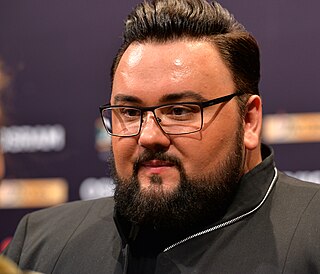
Jacques Houdek is a Croatian recording artist who represented Croatia in the Eurovision Song Contest 2017 with the song "My Friend". Houdek began his professional solo career in 2000 and has since released many recordings and albums out which 13 have been certified silver, gold, platinum and diamond (once). Houdek is one of the mentors in the Croatian version of the TV talent show The Voice. During show's first season, he mentored the winner Nina Kraljić. Aside from Croatian, he has sung and recorded in English, Italian, German, Spanish, French, Slovene, Macedonian, and Māori language.
Croatia originally planned to participate in the Eurovision Song Contest 2020 with the song "Divlji vjetre" written by Ante Pecotić. The song was performed by Damir Kedžo. The Croatian broadcaster Croatian Radiotelevision (HRT) organised the national final Dora 2020 to select the Croatian entry for the 2020 contest in Rotterdam, Netherlands. Fourteen entries competed in the national final on 29 February 2020 and "Divlji vjetre" performed by Damir Kedžo was selected as the winner following the combination of votes from five regional juries and a public televote.
